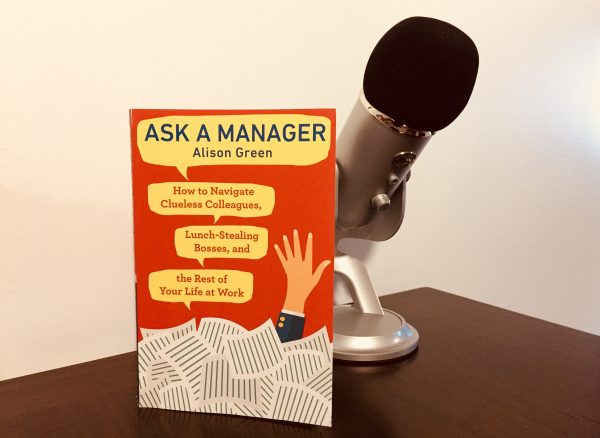Talking to Alison Green About the New “Ask a Manager” Book

I know that a lot of you are already familiar with Alison Green and Ask a Manager, but I’m not sure if everyone knows that Alison’s new book, Ask a Manager: How to Navigate Clueless Colleagues, Lunch-Stealing Bosses, and the Rest of Your Life at Work, just released TODAY.
I got an advance copy, and I also got to talk to Alison about how she structured the book, how people can initiate those awkward workplace conversations, and what advice she has for Billfold readers.
My first question was about the book itself, because you often see people pull a bunch of their old columns or essays off the internet and turn them into a book — and Alison did not do that. Ask a Manager includes a handful of never-before-published letters and responses, but the book itself is actually a how-to guide, with step-by-step instructions for dealing with situations such as “you’re going to miss a deadline” and “turning down a coworker who asks you out.”
“I wanted to write something new,” Alison explained. If readers wanted the Ask a Manager advice column, they could visit the website and the archives. This book would be a different type of resource, and it would attempt to answer the question at the core of nearly every Ask a Manager advice letter: “How do I say this really difficult thing without having it result in months of tension at the office?”
So, if you’re asking yourself how to deal with a coworker who keeps CC’ing your manager on all their emails, you could open the book, turn to the section titled “Conversations With Your Coworkers,” and find multiple scripts for dealing with this scenario, starting with:
“I’ve noticed that you’re CC’ing Flora on most of your emails to me. Is there a reason you’re looping her in?”
You’ll notice that this script is only two sentences long. Last month, I shared Alison’s Ask a Manager podcast episode about salary negotiation, and you might remember the advice to keep the negotiation conversation to a single sentence: “Any chance you can go up to $X?”
“As a general theme,” Alison said, “people assume these conversations have to be more lengthy and complicated than they really do.” She suggests writing down a script or a series of bullet points before having an awkward conversation, and practicing what you’re going to say out loud. Some people have so much trouble with these types of conversations that they automatically skip over the most important part — which is why you might have a meeting with your manager where they never actually say the words “we’re unhappy with your performance,” even though that was supposed to be the whole point of the meeting. We have a tendency to avoid discussing anything that might be “painful or difficult,” as Alison put it, and practicing the words in front of the mirror will help you say them to a coworker or boss when the time comes.
The other part of the Ask a Manager book that I really loved was the acknowledgement that the rules are different for entry-level vs. senior staff, or for people with a lot of workplace capital (longer tenure, stronger relationships, less replaceable) vs. people who haven’t yet built up their capital. As Alison explained: “The more you bring to your employer, the more ability you have to ask for things.”
Of course, you can lose capital if you ask for too many things — and Alison suggests that if you’re a person with a decent amount of capital in your workplace, you should use at least some of it to help other people get the resources they need to succeed at their jobs. “This shows that you’re not just interested in yourself. You’re interested in the success of the organization.”
I ended our conversation by asking Alison if she had any money-and-career advice for Billfold readers, and here’s what she said:
“You’ve really got to advocate for yourself. So many people are leaving money on the table just to avoid a slightly awkward five-minute conversation. Once you do it, it gets easier. Just speak up!”
Who else is going to order the Ask a Manager book or get it from your local library?
Support The Billfold
The Billfold continues to exist thanks to support from our readers. Help us continue to do our work by making a monthly pledge on Patreon or a one-time-only contribution through PayPal.
Comments